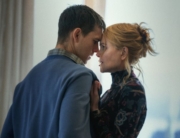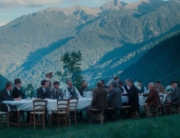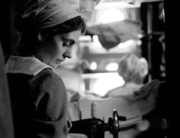The road is endless for those on the run. For Lou (Kristen Stewart) and Jackie (Katy O’Brian), that will be their unexpected and shared destiny when their paths cross at the right time and place to fall in love. Set in the last 1980s in a scorching New Mexico, writer/director Rose Glass constructs a world as sensual as it is arid. Co-written with Weronika Tofliska, the script at first seems crafted with more affectation than the desire to tell a coherent story. However, this is not necessarily a flaw. For a good part of the movie, the wild and dangerous atmosphere finds its tender counterpart in the relationship between the two women.
Lou is the reserved manager of a small-town gym. Her sister, Beth (Jena Malone), is unfortunately married to the jerk JJ (Dave Franco), and Lou hasn’t spoken to her father, Lou Sr. (Ed Harris), since the mysterious disappearance of her mother. Nothing exciting happens to her outside of her fights with JJ, whom she suspects of physically abusing her sister—but Beth always defends him—and a visit from the FBI, urging her to provide information about her missing mother’s whereabouts. The disappearance could be connected to Lou’s activities as a local crime boss.
Everything stops being boring and lifeless when she meets Jackie, a bodybuilder who dreams of participating in a competition in Las Vegas. She mysteriously arrives without disclosing anything about her past. Initially, Lou is attracted to Jackie’s magnetic presence and provides her with contraband steroids that will help her prepare for the competition. One night is enough for them to get to know each other and decide to live together.
What begins as a romance quickly becomes complicated by the surrounding criminal context. (Jackie works for Lou Sr. without suspecting the parentage link with her girlfriend.) Meanwhile, when Beth is hospitalized with bruises on her face, it becomes clear that her husband’s abuse has gone too far. Although Lou wants to give him what he deserves, it is Jackie who ultimately executes that revenge against JJ on her own, especially because her body seems to be animated by an uncontrollable thirst for violence. (Steroid rage?) Her muscles tense, veins bulge, and sometimes hallucinations take on a tangible dimension overtaking reality.
It’s a visual feast (cinematographer Ben Fordesman’s proliferation of reds and neon lighting) and a sonic delight (Clint Mansell’s pulsating soundtrack) after the women become outlaws. Here Glass blurs the boundaries between explicit and shocking violence, not far from realism, but also stylized, reminiscent of the dreamlike, terrifying visions in her debut Saint Maud (2019), which left pending what happened in reality and what was experienced within the fractured psyche of its protagonist.
As bodies pile up and misunderstandings increase, the crimes, the bursts of violence—both real and hallucinated—turn Love Lies Bleeding into a peculiar crime caper that ends up becoming a bit more generic in its neo-noir aspirations. Yet two of the best scenes involve breaks with reality that make imaginative use of special effects. One of them features an unforgettable vomiting scene, and the other is an unexpected homage to a 1933 classic film. And the exploration of the bodybuilding universe is tangential, but much more inviting in its brief glimpse than the small-town criminal tale that we have seen many times before. Though Glass pursues something bigger and more ambitious with her second film, she sacrifices the symbolic and conceptual clarity that worked so well in her debut.
However, there are enough pleasures in Love Lies Bleeding not to dismiss it. The chemistry between the leads is phenomenal. O’Brian is particularly a revelation with star potential. As for Stewart, she remains an unpredictable star, hitting the mark in choosing unique projects that call on her to reinvent herself. And of course, a sapphic Bonnie and Clyde doesn’t come around every day.







Leave A Comment